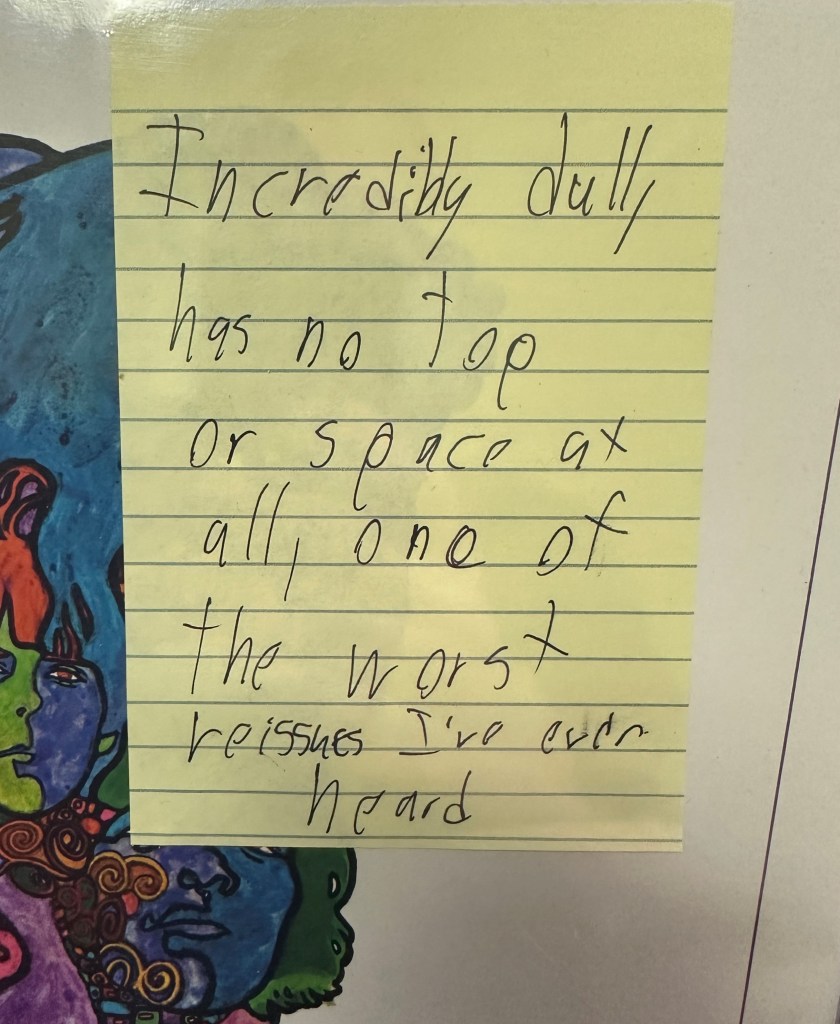 Robert Brook has a blog which he calls
Robert Brook has a blog which he calls
A GUIDE FOR THE DEDICATED ANALOG AUDIOPHILE
Robert’s story begins:
Recently a friend and a frequent reader of my website suggested I review the 50th Anniversary Edition of David Crosby’s debut. He’d read my article from a while back in which I made comparisons between two different Hot Stamper copies of the record, and he knew I was a fan the album.
I’m sure he also knew, as any of my regular readers would, that I’m extremely skeptical of modern reissues. You can find many examples on this site of reissues I’ve written about that have failed miserably to impress me. But this friend was pretty insistent that this one, remastered by long time engineer Chris Bellman, was different. He also told me it was on par with original Monarch pressing of …My Name he also owned.
Bellman was responsible for cutting one of the few heavy vinyl reissues that my friend Tom Port has liked and recommended – a European pressing from 2020 of the Dire Straits record Brothers In Arms. Tom likes precious few “audiophile” reissues. He’s mentioned maybe 4 or 5 over the years as being worthy of any consideration. Given that, and the fact that my friend was so insistent, I figured why not give Bellman’s recut of . . .My Name a shot?
Click on the link to read the whole thing. I left some comments at the end you may enjoy reading. I hope to be able to address some of the other issues Robert brings up at a later date.
If you are interested in picking up an amazing Hot Stamper pressing of the album, we currently (as of 2/24) have some in stock. Click on this link to see what is available: If I Could Only Remember My Name.
On the website, we talk about just how much we love this album:
It’s the ultimate hippie folk rock Demo Disc – both sides are amazingly transparent, with huge amounts of bass, silky highs, in-the-room vocals and tons of Tubey Magic
Here it is, folks…a true rock Demo Disc! An outstanding copy such as this will show you why we’ve long considered it one of the top rock albums for both sound and music. You will not believe how Tubey Magical and three-dimensional this album can be when you have a pressing with this kind of sound. The harmonic complexity and extension on the acoustic guitars are absolutely stunning.
Harry Pearson put this record on his TAS list of super discs, not exactly a tough call it seems to us. Who can’t hear that this is an amazing sounding recording? (We do applaud his decision not to add the Classic pressing of this title to the list, the way he did with so many other Classic pressings that have no business on anything called a super disc list.)
When you drop the needle on this record, all barriers between you and the musicians are removed. You’ll feel as though you’re sitting at the studio console while Crosby and his no-doubt-stoned-out-of-their-minds Bay Area pals (mostly Jefferson Airplaners and Grateful Deads) are laying down this emotionally powerful, heartfelt music.
The overall sound is warm, sweet, rich, and full-bodied…that’s some real ANALOG Tubey Magic, baby! And the best part is, you don’t have to be high to hear it. You just need a good stereo and the right pressing.
I discovered the album in the 90s, probably from reading about it in The Absolute Sound. When I was in my thirties and buying records regularly, the album was essentially out of print. The (awful sounding) Super Saver came out in 1975 and probably was deleted before long due to a lack of demand.
Once I had heard the record, it quickly became a go-to test and demo disc, mostly for the song Traction in the Rain. The sound of the autoharp on that track is one of the most amazing things I have ever heard, on any album, ever. The exceptional resolution and harmonic coherency of the multiple electrostatic arrays I was using for the mids and highs were perfectly suited to that instrument, and that track.
I listened intently for the notes that got louder and softer as the instrument was strummed. The more different each note sounded, the more micro-dynamics I knew I must be reproducing. I tweaked and tested my system for months, even years with this track.
I didn’t know enough to buy other copies and compare them to mine. I just knew it was a great sounding record that I could blow people’s minds with in a demo.
I credit it with making me a more critical listener and also with helping me make progress in audio.
Over the last twenty years I can recall a number of tweaking sessions in which I tried to get If Only I Could Remember My Name to sound better, knowing that the better it sounded, the better all my other good records would sound.
The second, third and fourth tracks on side one are excellernt for this purpose, as is the second track on side two.
On big speakers at loud levels this album is a thrill.
Further Reading

 Our Story Begins
Our Story Begins